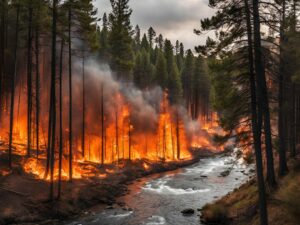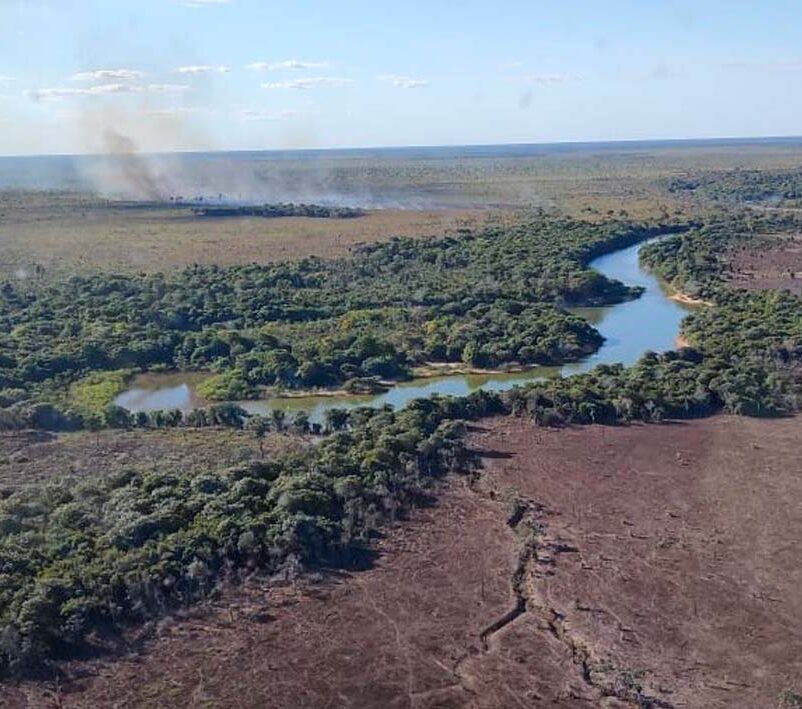The article highlights the need to consider freshwater ecosystems in integrated fire management and provides recommendations to help advance this field of research
As wildfires become increasingly frequent and intense due to climate change and land use changes, their impact on freshwater ecosystems has garnered attention. While terrestrial ecosystems often dominate discussions, streams and rivers, which provide vital ecosystem services like clean drinking water, fisheries and recreational opportunities, are also significantly affected. In the paper “Fire impacts on the biology of stream ecosystems: A synthesis of current knowledge to guide future research and integrated fire management” published in Global Change Biology, researchers from the Global Forest Ecosystem Research group of the Forest Science and Technology Centre of Catalonia (CTFC) review existing literature to understand how wildfires and prescribed burns influence stream biodiversity and ecosystem functioning, highlighting research gaps and proposing directions for future studies.
“Freshwater ecosystems host disproportionately high biodiversity and provide essential ecosystem services, yet they are being degraded at an alarming rate. Understanding how fire affects these ecosystems is crucial for developing fire and watershed management strategies that protect biodiversity and ensure the continued provision of ecosystem services,” explains Maitane Erdozain, postdoctoral researcher and first author of the paper.
The review shows that most research has focused on abiotic indicators, such as water chemistry, rather than biotic ones, primarily in small streams in North America and temperate evergreen forests. Biological responses to fire vary widely, influenced by factors like post-fire hydrological events, the time between the fire and sampling, and whether riparian forests burned. While wildfires and subsequent hydrological events can cause dramatic short-term impacts on aquatic life, such as decreased fish density and shifts in aquatic insect communities, most biological indicators recover within 5-10 years.
However, the study identifies several limitations in the current literature. The predominant focus on North America and temperate evergreen forests limits the generalizability of findings to other biomes, such as fire-dependent savannahs, Mediterranean forests, and fire-sensitive tropical forests. The review also notes the need for more studies on the effects of prescribed burns. This management strategy that is being increasingly promoted to reduce the risk of wildfires has shown minimal impacts on stream ecosystems but is underrepresented in the reviewed literature.
 To advance this field, the authors recommend incorporating functional indicators into studies, expanding the research to underrepresented regions and biomes, implementing before-after-control-impact study designs to distinguish fire effects from natural variability, examining prescribed fires, clearly and consistently reporting factors such as fire severity, assessing the implications of different riparian forest management strategies, and investigating how effects in small streams propagate into larger rivers.
To advance this field, the authors recommend incorporating functional indicators into studies, expanding the research to underrepresented regions and biomes, implementing before-after-control-impact study designs to distinguish fire effects from natural variability, examining prescribed fires, clearly and consistently reporting factors such as fire severity, assessing the implications of different riparian forest management strategies, and investigating how effects in small streams propagate into larger rivers.
The practical implications of this research are immediate and crucial. The paper emphasizes the pressing need for integrated fire management that includes freshwater ecosystems, especially in light of escalating wildfires and accelerating biodiversity and water crises. By integrating these findings into fire and watershed management strategies, managers can better protect stream ecosystems, thereby ensuring the persistence of essential services and biodiversity.
This work, supported by the FIRE-ADAPT project under the Marie Skłodowska-Curie Actions Staff Exchanges 2021 scheme within the Horizon Europe funding program, “unifies and synthesizes the scientific knowledge about the impact of fire on aquatic biodiversity and ecosystem services, and thus, it directly relates to the global debates on wildfires, forest management and water in the context of global change” summarizes Sergio de Miguel, head of the Global Forest Ecosystem Research group, professor and principal investigator of the FIRE-ADAPT project at the University of Lleida, and coordinator of this study.
Further information:
Erdozain, M., Cardil, A., & De-Miguel, S. (2024). Fire impacts on the biology of stream ecosystems: A synthesis of current knowledge to guide future research and integrated fire management. Global Change Biology, 30(7), e17389. https://doi.org/10.1111/gcb.17389
Last modified: 10 July 2024










